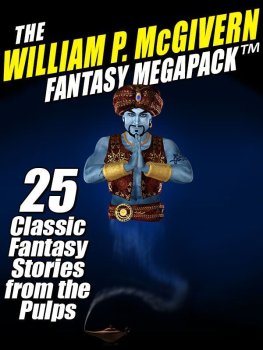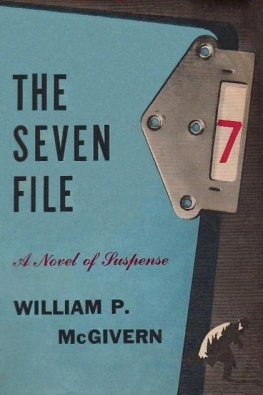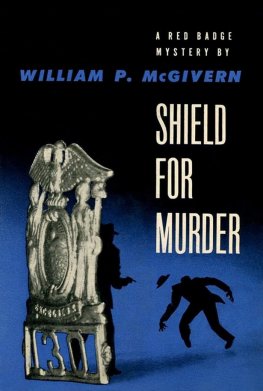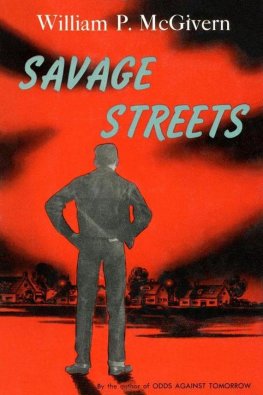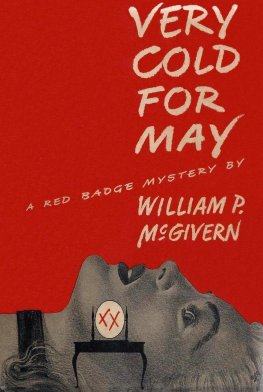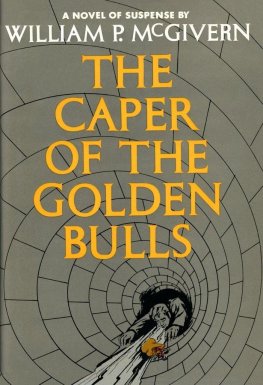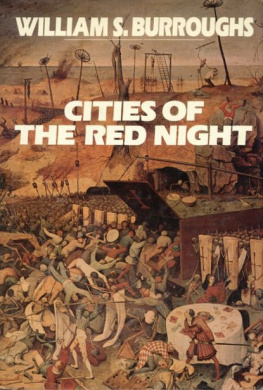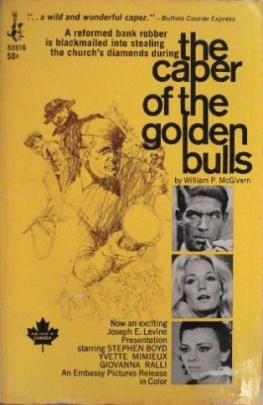William McGivern - Night of the Juggler
Here you can read online William McGivern - Night of the Juggler full text of the book (entire story) in english for free. Download pdf and epub, get meaning, cover and reviews about this ebook. genre: Detective and thriller. Description of the work, (preface) as well as reviews are available. Best literature library LitArk.com created for fans of good reading and offers a wide selection of genres:
Romance novel
Science fiction
Adventure
Detective
Science
History
Home and family
Prose
Art
Politics
Computer
Non-fiction
Religion
Business
Children
Humor
Choose a favorite category and find really read worthwhile books. Enjoy immersion in the world of imagination, feel the emotions of the characters or learn something new for yourself, make an fascinating discovery.

- Book:Night of the Juggler
- Author:
- Genre:
- Rating:3 / 5
- Favourites:Add to favourites
- Your mark:
- 60
- 1
- 2
- 3
- 4
- 5
Night of the Juggler: summary, description and annotation
We offer to read an annotation, description, summary or preface (depends on what the author of the book "Night of the Juggler" wrote himself). If you haven't found the necessary information about the book — write in the comments, we will try to find it.
Night of the Juggler — read online for free the complete book (whole text) full work
Below is the text of the book, divided by pages. System saving the place of the last page read, allows you to conveniently read the book "Night of the Juggler" online for free, without having to search again every time where you left off. Put a bookmark, and you can go to the page where you finished reading at any time.
Font size:
Interval:
Bookmark:
William P. McGivern
Night of the Juggler
Chapter 1
His name was Gus. He had another name, of course, a last name, but sometimes he forgot it. When this occurred, when he was swept by a dreadful and chilling loss of identity, the experience made him as tense as a threatened animal and deepened a redness in his mind that caused him to shake with fury.
When they teased him about this in the fruit and vegetable store he helped keep clean, when the Puerto Rican clerks would laugh at him and say, Hey, Gus! You Gus who? Gus who? he would avoid their eyes and try to control the trembling in his hands, while wondering in his dim, lacerated mind at their cruelty.
When this happened, when the insolent clerks with their soft eyes and glossy hair and slurred, liquid English grinned at him and teased him, Senor Perez, who owned this decrepit vegetable shop in the South Bronx, would give them angry, warning headshakes, and the clerks would stop smiling and some might even shrug in a gesture that suggested an indifferent contrition, and then they would all return to their work, ripping brown outer leaves from heads of lettuce, watering mounds of green onions and young cabbages, waiting on the Puerto Ricans and occasional blacks who bought their meager orders of fruits and vegetables at Senor Perezs shop in this pocket of decay in New York City.
At these times Gus would go into the back room of the shop, and when no one was looking at him, he would hurry into the alley that ran through an area near 135th Street and St. Anns Avenue. He was more at home in alleys and in darkness than he was in the shop or in daylight on crowded sidewalks. A tall, huge man, Gus went along the alley with the stalking strides of an animal, at home with the stink of garbage, the slithering sound of rats, and groups of Puerto Ricans in leather jackets bunched ominously at street corners; none of this fetid and potentially dangerous ambiance menaced him; it was not so much that he was confident in this environment, it was rather that he was simply unaware of it.
In the vestibule of the tenement where he lived with Mrs. Schultz in a small rented room, Gus would stare with an annealing sense of impending relief at the dirty oblong cards beneath the mailboxes.
When he found Mrs. Schultzs name, he would drop his eyes an inch and there, penciled in below it, was his own name: Gus Soltik. He never received any mail; there was no one to write to him, but it gave him a sense of security to know that his name was written there under the mailbox. He couldnt read his name in a conventional sense, but he had memorized those particular letter shapes and knew the smudged pencil marks meant Gus Soltik.
While he could not make change and had only vague notions of the value of money, he was familiar with the concept of numbers and could easily make his way to the numerically designated streets in the various boroughs of New York City.
Gus Soltiks thought processes were unconventional, to put it as simply as possible. He did not think in consecutive patterns; it was as difficult for him to string ideas together as it would have been for a normal person to enumerate and define the physical objects of his environment without an alphabet. Thus, to understand concepts and emotions and things, Gus Soltik required a specific word, which appeared in his mind as clearly as if it were written in chalk on slate.
Thus, the word cage was his reference for all animals. He had no name, however, for his physical needs. He had no way to get inside himself; he was conscious of his existence as an object, but there was no way he could assess or conceive of Gus Soltik in subjective terms.
He did not know that his odor was rank. He wasnt aware that people on the sidewalks frequently turned to stare after him. He did not understand why it made him feel so desolate and desperate when he forgot his name. It was one of many things he didnt understand, although it worried him the most. He didnt know that his physical strength was as great as the combined strength of several average men. He did not know, for another thing, that the small yellow leather hat he wore above his bulging forehead made him look ridiculous, as if he were a mongoloid child dressed by someone with a malicious sense of humor.
But Gus Soltik knew some things with the instincts of an animal. His eyesight was acute, and his sense of hearing was exceptional; he was always the first to be aware of approaching subway trains, for example, and in the old tenement where he lived, he could track Mrs.
Schultz all through the house by her footsteps, even though she wore soft felt slippers indoors. His sense of direction was impeccable; he could drift through any of the boroughs of New York at any time of the day or night, but when he wanted to return home, some indicator in his mind pointed straight at the Triboro Bridge in the lower Bronx. He could walk for hour after hour, mile after mile, sometimes breaking into a clumsy, lumbering trot but never feeling tired, never breathing hard.
And one other thing, Gus Soltik knew. He knew that he was thirty years old. His mother had died when he was twenty-five, and after she died, he did something each year, and he had now done it four times.
And he would do it again within the next twenty-four hours, a total of five times in all, which made him thirty.
He knew vaguely that it was disloyal to his mother to forget his name.
All he had left of her now was one of her dresses, black and shapeless but with a pretty collar made of tiny seed pearls. That dress hung in the small back room he rented from Mrs. Schultz, and with the dress were the dried flowers and the card.
It was all he had left of his mother.
But Gus Soltik, with the instinct of a wild creature, could always sense the approaching anniversary of her death. It was the time of year when the days were darker and shorter and the winds against his bulging forehead and massive hands were streaked with a coldness which would intensify until snow was falling in the streets and the gutters were noisy with the sound of running slush and water. And when it became cold, he listened and watched Mrs. Schultz with the wariness of an animal because the old woman did something each year that told Gus Soltik the exact day his mother had been killed.
On each anniversary of his mothers death Mrs. Schultz paid the priests at the crumbling heap of St. Stanislaus to celebrate a requiem high mass to deliver his mothers soul from all evil and from the torments of hell. She had tried to explain all this to Gus, but he understood nothing but the horror of his mother screaming in some place that raged with fire.
Mrs. Schultz had taken him to the first mass. But he had never gone again; he had been frightened by the three black-clad priests on the altar, and the sound of the vengeful, wrathful music from the choir loft had so terrified him that his heart had thudded and pounded like an imprisoned animal within his massive rib cage. So he had never gone again. But Mrs. Schultz was proud and happy to save her dimes and quarters until she had enough to pay for that dead mass which commemorated the soul of Gus mother.
When she told him about it, he knew the time was coming; when she waddled off to the church thick with sweaters under her old black coat, Gus Soltik knew for certain it was now time to mark the day of his mothers death.
On an afternoon in the middle of October, Gus Soltik sat in the sunlight of Central Park and looked at little girls playing in the childrens zoo at Sixty-sixth Street and Fifth Avenue.
There were blacks and Puerto Ricans and white girls, some running in shrill packs, others accompanied by young mothers or nurses. The sun was warm on the backs of Gus Soltiks hands and warm on his face, and the iron bench he sat on was pleasantly warm, excitingly so, under his heavy, powerful thighs.
Font size:
Interval:
Bookmark:
Similar books «Night of the Juggler»
Look at similar books to Night of the Juggler. We have selected literature similar in name and meaning in the hope of providing readers with more options to find new, interesting, not yet read works.
Discussion, reviews of the book Night of the Juggler and just readers' own opinions. Leave your comments, write what you think about the work, its meaning or the main characters. Specify what exactly you liked and what you didn't like, and why you think so.

